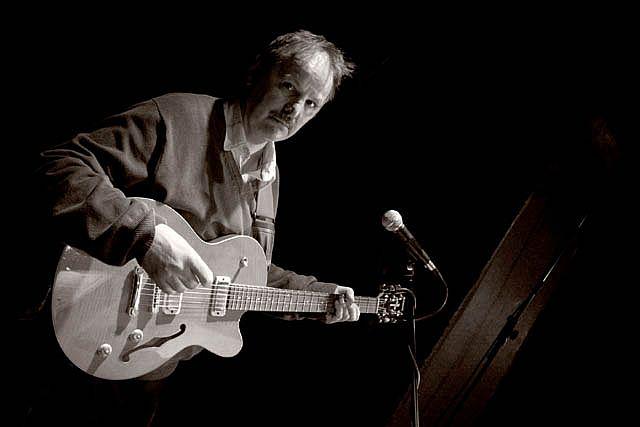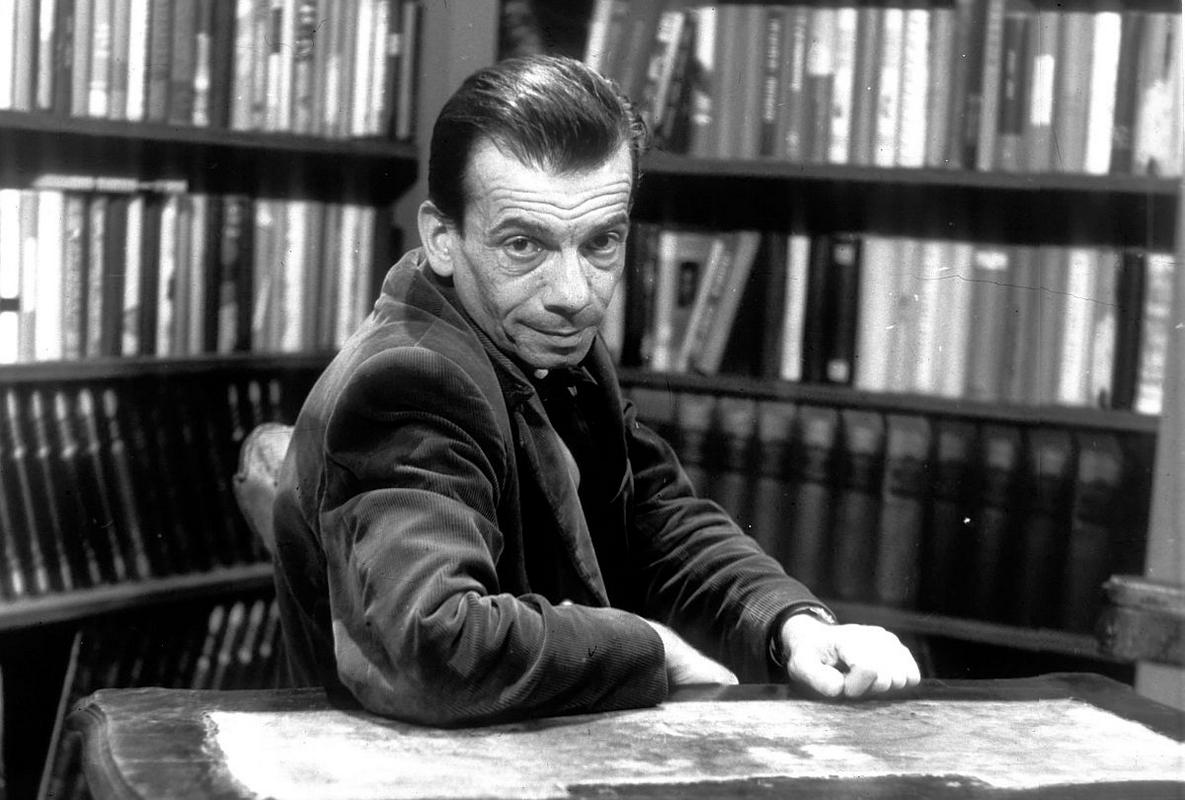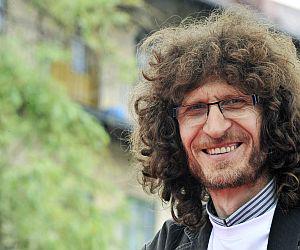


To my generation, music was extremely important. It meant a generational identification for us. Of course, the knowledge of the modern "serious" music was superficial, it was about mass culture, which was something new and fresh then. We were expressing ourselves most authentically with popular forms of urban music, but the rock music was dominant. Today, young people express themselves differently: with computers, cellphones and theatre.

Jani Kovačič, Marko Brecelj and Tomaž Domicelj "reigned" in Slovenia, as did Andrej Šifrer and Marijan Smode a bit more commercially. The original singer-songwriters in our country belonged to the same "flower children" movement that developed in the world in the seventies as a response to American expansionism.
When it comes to Slovenian singer-songwriters, special attention goes to Fran Milčinski – Ježek. As an exceptional songwriter and follower of social happenings, he really managed to point to the nonsense and weaknesses of the system in an amusing way. In recent years, Iztok Mlakar and Adi Smolar have come really close to Ježek with their original lyrics. Lately, singing and song-writing have been re-emerging as a particular form of stage performance in Slovenia. We often encounter famous Slovenian music stars in this role, such as Vlado Kreslin and Zoran Predin, followed by the recent festival star Rudi Bučar.
Some of the not so famous singer-songwriters are performing just so they can tell their stories to the world – about the little people and big injustices, intimate experiences of fleeting beauty and the immortality of love. They do it to inspire their listeners, satisfy them and maybe encourage them to become active. Just as singer-songwriters once did.
First singer-songwriters – rebellious poetry
According to the unofficial data, the first singer-songwriter was Tomaž Domicelj. He recorded for Radio Ljubljana and appeared on television along with Slovenian pop singers and soft hippies at the end of the 60s. In 1967, he made his own version of the song Where Have All the Flowers Gone by Pete Seeger (to Kam so šle vse rožice ). He wrote Dajte nam svet (Give Us the World) and Fant s kitaro (Boy with a Guitar) in 1969. A year later he did a remake of Donovan's Colours named Barve and released his first small record for Belgrade's label RTB. Although the songs were a bit mellow, his image was obviously that of a protest singer.
The turning point for Slovenian singing and songwriting was 1977. When punk was all the rage in England, our largest label at RTVS decided to release three big records; the already mentioned Domicelj's Tomaž v živo (Tomaž Live), Mežek's Kje so tiste stezice (Where Are Those Paths) and at the beginning of the following year Šifrer's Moj žulj (My Blister).
Aleksander Mežek made his first recordings at the end of the 60s in a mobile studio brought to Zagreb by Cliff Richards' collaborators. "I knew three songs by Bob Dylan and the English were totally stunned to find a kid in Yugoslavia who knew how to play Dylan. They even said, come to London, if you want, and you will make a record." He went later and met Richards. "They took me to the art festival and set me up on stage, folks were impressed, and Cliff was sitting on the grass just below the microphone. I said to myself, I will either completely fail today, or I will do something, and so I played beautifully." He says that singer-songwriters were the ones who broke free from commercialism in Slovenia. "It was kind of a revolution," says Mežek, with whom Andrej Šifrer initially worked a lot, and Mežek was a producer and arranger of Šifrer's single Zoboblues (Teeth Blues).
Most of our well-known artists arose in the late 70s or early 80s. We can't leave out Marjan Smode, native of Koroška (Carinthia), our most commercial singer-songwriter. A hippy look, a big peace sign on the guitar, and lots of hits... He outsold Avsenik's single Tam, kjer murke cveto (Where Nigritellas Blossom) with the album Jožica.
Probably the most important artist to emerge in Slovenia in the 70s was Jani Kovačič. Rebel poetry, sharper guitar, hoarse vocals... he flew on the wings of punk, and if you were recognised by punk rockers, then success was guaranteed.” His influences are surprising: Edith Piaf and Janis Joplin instead of Ian Dury, the most independent English punk rocker at that time. "And in the process of composing the influence came from folk songs, chansons, beat poetry and – literature, from newspapers to monuments," says Kovačič, who started out in the mid-70s with the adaptation of the hit Be Bop A Lula. He finally settled down with Jest grem gor na Škofljco (I'm Going Up To Škofljica). At first he tackled social issues, Otroci samohranilk so pokvarjeni (Children of Single Mothers are Scumbags), Žare lepotec (Žare the Good-Looker), Revolucija (Revolution), Delam kot zamorc (Working Like a Negro)... and later he dedicated himself to a more accurate matching of music with lyrics and established some professional backup bands. Lately he has been working on feature projects and translating the songs of other artists to Slovenian. Kovačič has so far prepared 23 different projects (1980–2003). Some of his works became folk tunes.
Music - generational identification
Just as most authors from the 60s and 70s left their rock bands or formed bands by themselves later, in the 80s, and even more in the 90s, Peter Lovšin (Pankrti, Sokoli), Vlado Kreslin (Avantura, Horizont, Martin Krpan) and Zoran Predin (Lačni Franz) started to perform independently and began to control their domestic regions and cities. Kreslin controls Prekmurje, Predin Maribor and Styria, Lovšin undoubtedly Ljubljana. Zoran Predin became a singer-songwriter when he realised that the guys with a guitar on the beach had a lot of success with girls; his role models were Bob Dylan, Leonard Cohen and Randy Newman, then Pengov, Brecelj, Kovačič and Mlakar. Why does he perform alone? "The difference is in the way of performing. With a band, the music is at an advantage, so the concert runs by the rhythms of an internal ritual with the introduction, twist, climax, end and additions. Being alone with the guitar makes you much more agile, you can react to the reaction of the audience, change the repertoire, prolong the song and make the words come to life. Of course, more concentration is required and performance takes a lot more energy," notes Predin, who is, like Vlado Kreslin, very active, especially with his mega concerts.
Kreslin performs alone or with an ethno orchestra, has recorded a commercial or two, and is an additional member of the band Siddharta; he can be a pop rocker at a concert, and he can adjust to the intoxicated audience at the Cvičkarija festival. He even managed the impossible: he created new hits out of unpopular songs from the period before Martin Krpan. Črna kitara (Black Guitar) is now sung in English by The Walkabouts, who declared: "That Black Guitar: A nostalgic lament written by the Slovenian “Bob Dylan”, Vlado Kreslin." And what do critics think about the Slovenian Zimmerman? They agree he became folksy. Without a doubt, he did more for the popularity of Prekmurje than Miško Kranjec and France Štiglic together.
The question is whether Kreslin is really a singer-songwriter. Zvone Tomac believes that he is still a rocker. Just like Peter Lovšin who disclosed his love for the Pistols, Clash and the Stones as long ago as the 70s. After the break up of group Pankrti, he tried playing with several bands, and then decided to perform alone. You can hear him at various events, from students’ drunken parties to mega rock'n'roll parties, mostly in rock apparel with sharp guitars, loud sound system and some ballads. Zvone Tomac therefore believes that the former punk rocker did not transform into a singer-songwriter, but into a rocker. He also considers Kreslin, Predin and Lovšin intellectuals, who know exactly how to work to make a living out of music.
Popularity among the masses currently holds Adi Smolar, a singer-songwriter who debuted in 1981 in Cerknica and twelve years later recorded and self-published his first cassette. He talks about life on stage: "Performance is almost a show, a monodrama with the beginning, middle and end."
To my generation, music was extremely important. It meant a generational identification for us. Of course, the knowledge of the modern "serious" music was superficial, it was about mass culture, which was something new and fresh then. We were expressing ourselves most authentically with popular forms of urban music, but the rock music was dominant. Today, young people express themselves differently: with computers, cellphones and theatre.

































































